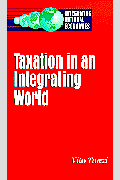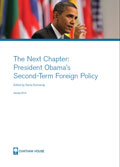What’s the latest thinking in fiscal and monetary policy? The Hutchins Roundup keeps you informed of the latest research, charts, and speeches. Want to receive the Hutchins Roundup as an email? Sign up here to get it in your inbox every Thursday.
The Tax Cuts and Jobs Act caused modest declines in profit shifting by multinational companies
The Tax Cuts and Jobs Act of 2017 lowered the federal corporate income tax rate and made U.S. firms’ foreign profits tax-exempt with the aim of disincentivizing multinational companies from shifting profits away from the U.S. Javier Garcia-Bernardo of Utrecht University, Gabriel Zucman of the University of California, Berkeley, and Petr Janský of Charles University find that the Act was followed by a 3-5 percentage point decline in the share of profits that U.S. firms booked in foreign countries. Much of this trend was driven by Alphabet, Microsoft, Facebook, and other large companies repatriating intellectual property to the U.S. However, the share of foreign profits booked in tax havens remained unchanged over the 2015-2020 period, the authors find. Specifically, U.S. firms continued to book around half of their foreign profits in low-tax countries in the periods preceding and following the Tax Cuts and Jobs Act. “These results suggest that additional policy efforts have the potential to further reduce profit shifting by U.S. multinational companies,” the authors conclude.
Foreign investors in Treasuries buy high and sell low
Foreign investors are more likely than domestic investors to purchase Treasuries when their prices are high and yields are low, find Zhengyang Jiang of Northwestern and Hanno Lustig and Arvind Krishnamurthy of Stanford. This evidence suggests that foreign investors (both private and official sector) are not searching for returns on their investment, but instead value Treasuries for their safe asset properties. The authors find that, since 1980, foreign investors in Treasuries have underperformed domestic investors by 1.5% annually. In addition, foreign investors have underperformed a simple buy-and-hold strategy by 3% annually, suggesting they are actively purchasing Treasuries when they are low-yielding and selling when they are higher-yielding. The authors argue that this trading strategy has lowered the U.S. government’s borrowing costs since the 1980s. However, they also document that foreign demand for Treasuries has weakened recently, with foreign investors shifting from net buyers to net sellers of Treasuries during the pandemic.
Excise taxes on alcohol reduce consumption among heavy drinkers
Exploiting an exogenous increase in alcohol excise taxes in Illinois and using household-level data on alcohol purchases over the 2007-2011 period, Henry Saffer and Michael Grossman of the City University of New York and Markus Gehrsitz of the University of Strathclyde find that higher excise taxes reduce alcohol consumption. The percentage decline in alcohol purchases among heavy drinkers (households at or above the 90th percentile of monthly alcohol purchases per adult) was similar to that of non-heavy drinkers, the authors find, challenging the idea that the consumption of heavy drinkers is not affected by price levels. Furthermore, on average, taxes did not increase prices paid for alcohol, because households switched to cheaper alternatives. However, this was not true of low-income households, who did pay more for alcohol after the excise tax increase. Since low-income households comprise a relatively small share of heavy drinkers, “the harm done to the low-income group by tax hikes may be more than offset by the benefits of reductions in heavy drinking,” the authors argue.
Chart of the week: Lumber prices have fallen sharply since March
Chart courtesy of The Wall Street Journal
Quote of the week:
“I support tightening policy by another 50 basis points for several meetings. In particular, I am not taking 50 basis-point hikes off the table until I see inflation coming down closer to our 2% target. And, by the end of this year, I support having the policy rate at a level above neutral so that it is reducing demand for products and labor, bringing it more in line with supply and thus helping rein in inflation. This is my projection today, given where we stand and how I expect the economy to evolve,” says Christopher Waller, Member, Federal Reserve Board.
“Of course, my future decisions will depend on incoming data. In the next couple of weeks, for example, the May employment and CPI [Consumer Price Index] reports will be released. Those are two key pieces of data I will be watching to get information about the continuing strength of the labor market and about the momentum in price increases. Over a longer period, we will learn more about how monetary policy is affecting demand and how supply constraints are evolving. If the data suggest that inflation is stubbornly high, I am prepared to do more.”
The Brookings Institution is financed through the support of a diverse array of foundations, corporations, governments, individuals, as well as an endowment. A list of donors can be found in our annual reports published online here. The findings, interpretations, and conclusions in this report are solely those of its author(s) and are not influenced by any donation.
The Brookings Institution is committed to quality, independence, and impact.
We are supported by a diverse array of funders. In line with our values and policies, each Brookings publication represents the sole views of its author(s).











Commentary
Hutchins Roundup: Multinational companies, Treasuries, and more
June 2, 2022